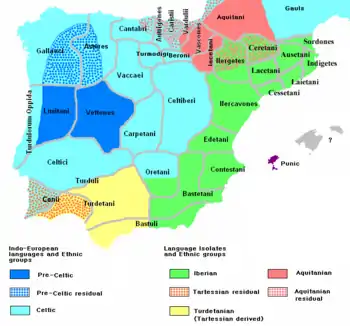Languages of Portugal
The languages of Portugal are the Portuguese, Mirandese and Portuguese Sign Language. Historically, Celtic and Lusitanian were spoken in what is now Portugal.
| Languages of Portugal | |
|---|---|
| Official | Portuguese |
| Regional | Mirandese |
| Foreign | English (25%)[1] French (15%) Spanish (10%) |
| Signed | Portuguese Sign Language |
| Keyboard layout | |
| Source | ebs_243_en.pdf (europa.eu) |
Modern
Portuguese is practically universal in Portugal, but there are some specificities.

Portuguese dialects of Portugal
- Dialects of the Portuguese in Portugal
- Alentejan Portuguese
- Algarvean Portuguese
- Azorean Portuguese (micaelense)
- Beiran Portuguese
- Estremaduran Portuguese
- Galician Portuguese (interâmnico)
- Madeiran Portuguese
- Barranquenho - In the town of Barrancos (in the border between Extremadura, Andalusia and Portugal), a dialect of Portuguese heavily influenced by Spanish is spoken, known as Barranquenho.
- Caló language - spoken by the Romani people in Portugal
- Minderico - a sociolect or argot spoken in Minde, practically extinct
- Mirandese language - A dialect of Astur-Leonese spoken in Miranda do Douro in northeastern Portugal, recognized officially as a minority language in 1999.
- Portuguese Sign Language
Historically
Other languages have been extensively spoken in the territory of modern Portugal:
Pre-Roman languages

Pre-Roman languages of Iberia c. 200 BC.
Roman, Post-Roman and Medieval languages
References
- "SPECIAL EUROBAROMETER 386 Europeans and their Languages" (PDF). ec.europa.eu. Archived from the original (PDF) on 2016-01-06.
External links
This article is issued from Wikipedia. The text is licensed under Creative Commons - Attribution - Sharealike. Additional terms may apply for the media files.

.png.webp)